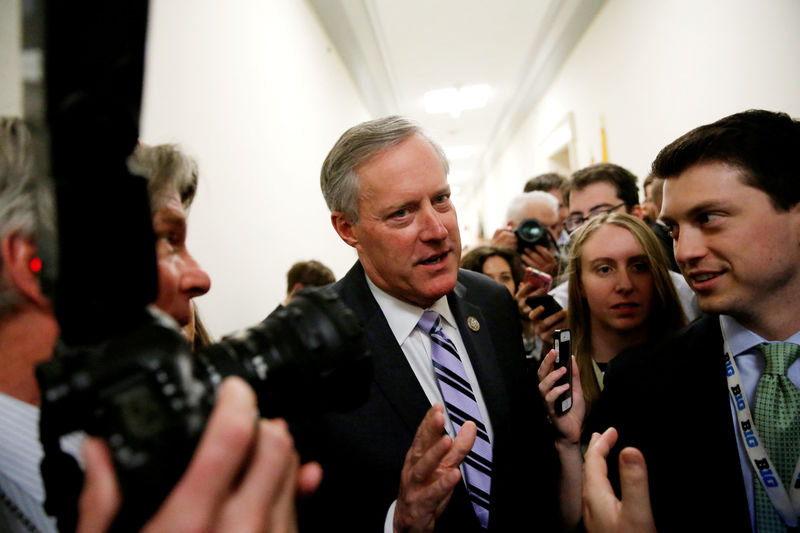Investing.com’s stocks of the week
By Roberta Rampton, Richard Cowan and Amanda Becker
WASHINGTON (Reuters) - Raw feelings and mistrust could pose an obstacle to President Donald Trump and hard-line conservative lawmakers in his Republican Party as they seek to rebound from defeat on healthcare legislation by launching into an overhaul of the U.S. tax code.
Trump has accused the Freedom Caucus lawmakers of snatching a "defeat from the jaws of victory" with their rejection of the White House-backed healthcare bill to replace President Barack Obama's 2010 healthcare reform bill.
In interviews with 10 of the roughly three dozen House Freedom Caucus members, the lawmakers said they were eager to put aside tensions over the healthcare debacle and seek common ground on tax reform.
But there is no consensus, even within the conservative faction, on details of a tax-reform bill, with some members open to discussing ideas such as the border tax plan supported by House leaders and others opposed to it.
Representative Warren Davidson, a Freedom Caucus member from Ohio, said Republicans should leave aside the blame game and work through their policy differences before launching tax reform legislation.
"Some people are still in that hurt-feelings and frustration" stage, Davidson said. "I do think it's smart to take the time to get it right."
Republican Representative David Schweikert of Arizona, a Freedom Caucus lawmaker who sits on the tax-writing House of Representative Ways and Means Committee, could emerge as a bridge between the conservative faction and House leaders. The panel will work closely with House leadership on the tax bill.
Schweikert said he planned to consult with rank-and-file members to discuss plans and listen to their priorities.
He said giving companies incentives to invest in plants and equipment was one of the items on his own wish list.
“My personal fixation is very simple: What maximizes economic growth?” Schweikert said.
CUTS, CUTS AND MORE CUTS
Representative Mark Meadows, chairman of the Freedom Caucus, said the group has "no formal position" on the structure of tax reform legislation.
But Meadows listed the top priorities on his own wish list: "Lower taxes, lower taxes and lower taxes."
A 35-page blueprint developed by House Republican leaders, known as a "Better Way," will serve as a starting point for the tax-reform discussions.
The plan calls for streamlining the income tax system and cutting the corporate income tax rate to 20 percent from 35 percent. It would exclude export revenue from taxable income and impose a 20 percent tax on imports.
The border tax proposal has divided the business community and is a top flashpoint for lawmakers. Big exporters such as General Electric (NYSE:GE) Co say the tax would boost manufacturing and jobs. But retailers like Target Corp (NYSE:TGT) have said the border tax would hike consumer prices and hurt the economy.
Trump, a businessman who had never been in public office until he took over at the White House on Jan. 20, has at times praised the border tax idea but at other times has been noncommittal.
Virginia Congressman Dave Brat said he would insist that the tax bill not add to the deficit, while Meadows said he would not necessarily insist on that.
Other conservatives said they needed more information about the tax bill to form an opinion - and some space from the contentious health care debate.
“We just had a major battle on a Republican welfare plan and that has consumed to a large degree my time and mental effort," said Alabama Representative Mo Brooks.
"When we have a tax reform bill I can evaluate, that's when I'll start voting on it," Brooks said.
As a sign of tensions that have lingered after the collapse of the healthcare bill, Freedom Caucus lawmakers faced tough questioning from their colleagues during a closed-door meeting of House Republicans on Tuesday, said Representative Randy Weber of Texas.
But Weber said some of the friction eased by the end of the meeting, prompting House Speaker Paul Ryan to say that more give and take might have been useful in the healthcare effort.
"Ryan said: 'This is what we should have been doing,'" Weber told Reuters.
Republican Representative Ken Buck of Colorado, a member of the Freedom Caucus, said he thinks lawmakers learned lessons from the healthcare defeat that could apply to tax reform.
"I think people are going to work harder to get to 'yes' this next piece of legislation," Buck said.
A Reuters/Ipsos opinion poll released on Wednesday showed Republicans mostly blame Congress, and not Trump or party leaders, for failing to pass the healthcare overhaul.
